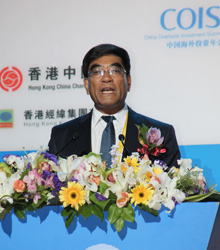| Sinopec Boss Awarded
 |
|
(XINHUA) |
Fu Chengyu, Chairman of China Petrochemical Corp. or Sinopec, was awarded the title of the Petroleum Executive of the Year in London on November 12 by the world's leading energy research group Energy Intelligence, becoming the first Chinese to win the title in 15 years.
The Petroleum Executive of the Year award, the most prestigious award in the international energy industry, recognizes outstanding executives' leadership in the field.
Fu started his career in the oil industry in 1982 in China National Offshore Oil Corp. He became Sinopec's chairman in 2011. Under his leadership, Sinopec's overseas operation has rapidly expanded to more than 20 countries and regions in Southeast Asia, Africa and South America.
China's consumer price index (CPI), a main gauge of inflation, dropped to a 33-month low of 1.7 percent in October, according to the National Bureau of Statistics.
The inflation rate, which dropped to its slowest pace since January 2010, dropped from 1.9 percent in September and 2 percent in August.
On a month-on-month basis, October's CPI fell 0.1 percent from the previous month.
Slowing growth in food prices and fewer carryover effects from last year contributed to the slight drop. Food prices in October rose by 1.8 percent year on year and fell by 0.8 percent month on month.
In the first 10 months, the CPI grew an average of 2.7 percent year on year, showing a further decline from the 3.3-percent rise in the first half of the year.
The producer price index (PPI), which measures inflation at the wholesale level, dropped 2.8 percent year on year in October. It marked the eighth straight month of decline after the PPI dropped in March for the first time since December 2009.
"We expect the mild inflation trend to persist through the first half of 2013," said Li Huiyong, chief economist with the Shenyin Wanguo Securities Co.
Although the country is poised to meet its goal of keeping inflation under 4 percent for the year, analysts have warned of rising consumer prices in November and December, as the cold weather will likely push up vegetable and meat prices.
China's trade surplus widened in October, as export growth accelerated and import growth remained steady, said the General Administration of Customs.
Exports rose 11.6 percent from one year earlier in October, beating market expectations for a rise of 9 percent and stronger than the 9.9-percent increase registered in September.
Imports climbed 2.4 percent year on year in October, unchanged from the growth in September.
This resulted in a widening trade surplus of $31.99 billion in October, compared with $27.67 billion in September and $26.66 billion in August.
The rise in exports was the strongest since May, but analysts have been cautious to call it a solid recovery because of sluggish external demand.
Weakening demand was reflected in the recently concluded Canton Fair, China's largest biannual trade fair, where total turnover dropped 9.3 percent compared with the fair's spring session.
In the first 10 months, foreign trade volume expanded 6.3 percent from the same period last year.
China has targeted growth of 10 percent in total foreign trade this year, a figure that officials concede will be difficult to achieve.
The European Union has been dumping toluene diisocyanate (TDI) into the Chinese market, the Ministry of Commerce said on November 13.
An eight-month investigation found imported TDI from the EU was as much as 37.7 percent below normal prices and that such dumping has hurt domestic producers, the ministry said in a preliminary ruling.
Importers of such products are required to pay anti-dumping fees to China's customs authorities. The deposits will be charged according to the dumping margins of different producers, said the ruling.
In March, the ministry launched an anti-dumping probe into EU-exported TDI, a main raw material for polyurethane products. TDI is widely used for rubber surface coating and in the textile processing, petroleum, mining, and automobile industries.
Regulators gave the green light to the first batch of companies to extract rare earth minerals under the country's new entry requirements.
The seven qualified companies included a subsidiary of Inner Mongolia Baotou Steel Rare-earth Hi-tech Co. (REHT), China's largest rare earth producer, said the Ministry of Industry and Information Technology on November 12.
The new entry requirements for the rare earth industry, released in August, listed a series of rules for project setup and layout, production scale, energy consumption and environmental protection.
The sector has been weighed down this year as rare earth prices fell from dizzying heights due to weak external demand and new rare earth production coming online.
As the world's largest rare earth producer, China supplies more than 90 percent of global demand for the minerals, which are crucial in the production of a range of hi-tech commodities such as wind turbines, hybrid car batteries and smart phones.
China has announced various measures to control environmental damage during the mining and processing of the minerals, including new industry entry requirements, stricter emission standards, production caps, as well as export quotas.
China will carry out its third economic census in 2013, said the State Council on November 12.
Statisticians from around the nation will survey all enterprises in secondary and tertiary sectors and the census will facilitate further economic planning.
The researchers will collect data related to enterprise ownership, financial status, production capacity and research and development activities during the yearlong census.
The Central Government and its local branches will jointly pay for the census.
The State Council ordered local governments to clamp down on potential irregularities in the census, including the falsification of data, forging census results and interfering in the census process. | 